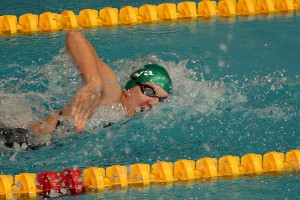With Britain’s swimmers safely assembled in Shanghai, the confidence surrounding their preparation is sure to be high. After all, the last two years have seen a steady improvement in performance, especially on the ladies’ team, and the squad enters the final global meet ahead of London 2012 with a host of medal chances.

The last World Championships in Rome, in 2009, yielded seven medals in the pool for Great Britain and, having been a relatively young team, all of those medallists (Fran Halsall, Rebecca Adlington, Jo Jackson, Gemma Spofforth and Liam Tancock) will be in Shanghai. With the possible exception of Jackson, who has struggled with health and form in the intervening period, all can be expected to challenge for podium spots again. Added to them, the likes of Hannah Miley, Lizzie Simmonds and James Goddard will expect to be in the hunt, but the scope for medals extends much deeper into the team.
The old adage that success breeds success is surely true here; six of the Rome medals were from the ladies and the best chances this time sit squarely in that half of the team and for a large part in Swansea.
Having recently returned to Swansea after an unsuccessful stint training in Florida, 2008 Olympic finalist Jemma Lowe is the fastest Briton in the 100m butterfly this year, ranked fourth in the world. Her qualification swim for that event was a showcase for her racing instinct; she touched out Rome silver medallist Fran Halsall by just one one-hundredth of a second in a last chance showdown to secure her place.
Lowe will double-up for the 200m butterfly in Shanghai and enters the championships ranked third in the world. She is joined in the longer fly by Australia-based Ellen Gandy who sits just behind her in fourth. Either could challenge, but Gandy has not been seen in serious competition since the British trials in March so her form remains something of an unknown, whereas Lowe was in sparkling form at the ASA Championships in June, setting a brace of Welsh records and personal best times.
The second Welsh lady to watch is Jazz Carlin. Also based in Swansea, the freestyle specialist was a medallist at the Commonwealth Games in Delhi last year and one quarter of the bronze medal winning 4x200m freestyle relay in Rome. She has built on that foundation with top-six ranked performances over 400m and 800m freestyle so far this year, with her best chance probably lying in the longer event. The step up from fifth in the world to the podium is a big one, but Carlin is hugely talented and the drop in time needed is not beyond the realms of possibility.
The final Swansea swimmer with podium pretensions is backstroker Georgia Davies. She heads to Shanghai only for the non-Olympic 50m event, but showed in June that she could be a force to be reckoned with over 100m with a time trial swim of 59.60 seconds – a time that would have placed her fifth in the world rankings this year. With the chance to give her international experience ahead of London, the selectors were willing to cast aside the limitations of their selection policy, which excluded non-Olympic events, to get her on the plane. She’s ranked third in the 50m, but in the sprints anything can happen.
On the men’s side, the chances are not so clear cut. Scotland’s Michael Jamieson came from almost nowhere to claim silver in the 200m Breaststroke in Delhi, and has continued to build on that performance. He goes to Shanghai ranked seventh, but has the potential to lower his time significantly. Whether it’s enough for the podium remains to be seen.
Another potential outside smoker is Loughborough’s Joe Roebuck, world number four in the 200IM this year. Roebuck has been a relatively late bloomer, winning his first senior international medal at last year’s European Championships at the age of 25, but has come on in leaps and bounds since, setting a host of personal best performances at trials. The 200IM event is packed with talent, not least a certain Michael Phelps, but Roebuck’s improvement in the last year makes him a decent long-odds punt for the podium.
But even if these long shots don’t win medals, just the experience of competing at this level will hold them in good stead for what is to come in Stratford next year. For while two thirds of the swimming gold medals in Athens and Beijing were won by medallists from the preceding year’s World Championships, a similar proportion of podium positions were filled by swimmers who had simply competed in the same event the year before, even if they hadn’t made a final.
It doesn’t always go to plan, however, so those who come away from Shanghai with their tails between their legs should take heart from the 2007 World Championship performances of one Adlington R. Tenth in the heats of the 800m freestyle in a time almost 10 seconds outside her best, Adlington beat a despondent retreat from Melbourne. We all know what happened 18 months later in Beijing.

